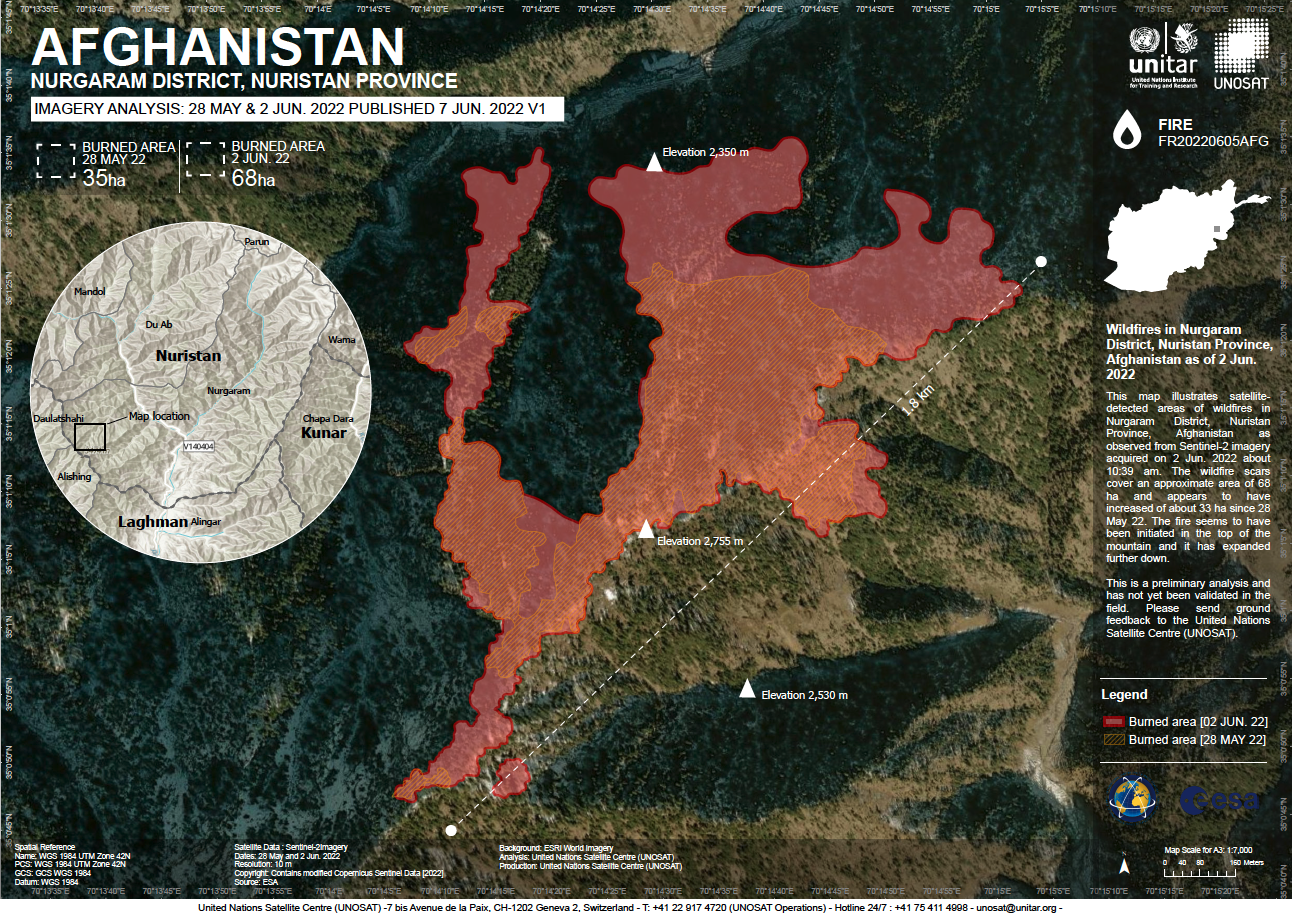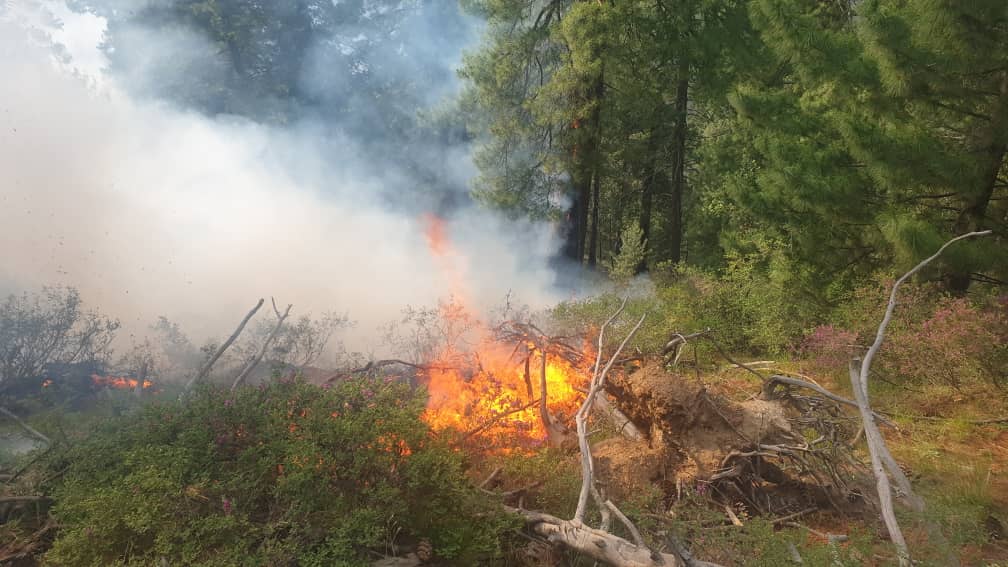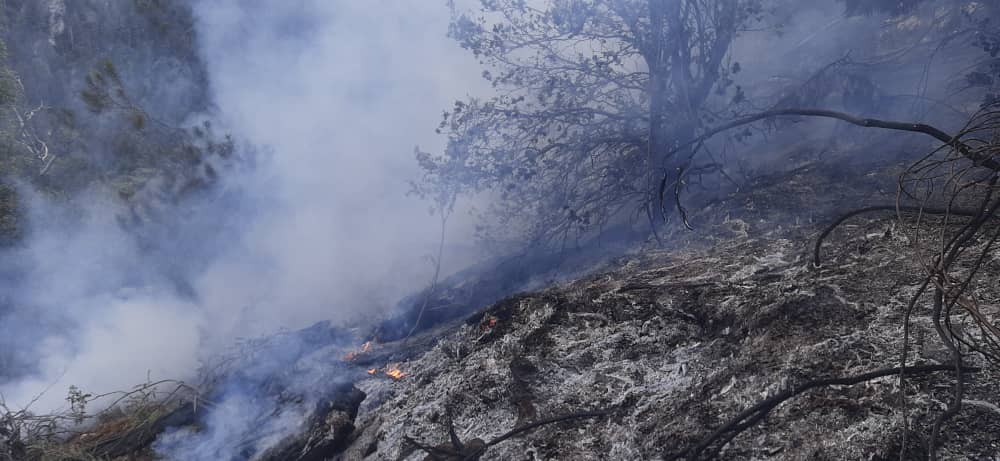Wildfire in Nuristan Burns Vital Source of Income
Resident of one of the villages in conflict over pine nuts harvest in Afghanistan’s Nuristan province set fire to the forest after a round of discussions didn’t gain any tangible results.

Written by Abdul Ahad Poya, edited by Mohammad J. Alizada, & Brian J. Conley
NURISTAN — More than two weeks have passed since a wildfire in Nurgram district of Afghanistan’s remote eastern Nuristan province was ignited, burning through a forest that houses pine nut trees, a vital source of income for the residents in that district, according to several sources.
According to a map published by the United Nations Satellite Center (UNOSAT) approx. 68 hectares of land was burned in the wildfire as of June 02. The agency said, “The fire seems to have been initiated in the top of the mountain and it has expanded further down.”
Sources speaking to Alive in Afghanistan from Nuristan are not clear who caused the fire, but claim that one of the two tribes living in Chayil and Bagh Tarang villages in the Sham valley of Nurgram district set fire to the forest after negotiations between both sides over the collection of pine nuts failed to achieve tangible results.
Ismail Atikan Nuristani, a former Nuristani parliamentarian, told Alive in Afghanistan in an interview that conflict between the Gujjar, a nomadic tribe that settled in the Sham valley several years ago, and the Nuristanis had been ongoing for several years.
MP Nuristani claimed that the Gujjars were the tribe who started the wildfire. But according to locals AiA spoke with, it wasn't clear who set the fire.

Sher Mohammad Dehati, a local from the Sham valley said the fire started on the 22nd of May and was extinguished on the 5th of June after a rainfall in the area.
“The people of the area were able to extinguish part of the fire by throwing dirt over it,” Sher Mohammad said, adding that Taliban officials had used the fire for photo-op, and did not provide any assistance.
Sher Mohammad said, “Nine men and several women from both villages got into a fight before the fire.”
Nuristan is one of the most remote provinces in Afghanistan nestled between steep mountains and rough terrain. Communication in and throughout the province is extremely difficult as cell reception is either completely unavailable or very limited.
Bashir Ahmad Ahmadi, an Alive in Afghanistan local freelancer traveled to Nurgram with other reporters to cover the incident a couple of days after the fire started. According to Ahmadi local people in Nurgram told him, “The fire was ignited in the area because of conflict between the people of two villages over the collection of pine nuts, it is not yet clear which of the villages set fire to the forest.”
Mr. Ahmadi and a pool of reporters who went to Nurgram were not permitted to travel to the fire’s location, a seven hour walk from the district center, by a decree of the Taliban district chief. There are no roads from the district center to the Sham valley and even mules or horses can only reach the valley with difficulty.
Sediq Hamdard, a Nuristan resident, said the people living in the Sham valley share the right for harvesting the pine nuts.
“When it’s time for harvest, each family collects for themselves, the amount gathered and sold also depends on the amount the family or individual gathers. Each family gathers between 70 to 280 kilograms of pine nuts each year,” Mr. Hamdard said.
According to Sediq, about 60 percent of revenue for Sham valley residents come from pine nuts. “Prices for each kilogram of pine nuts go from 5,000 to 1,5000 Afghanis ($56 to $168) depending on quality this year,” Sediq told Alive in Afghanistan, adding that prices before the collapse of previous Afghan government in August of 2021 were between 8,000 to 20,000 Afghanis ($89 to $224) per kilogram.
The reason behind the decrease in price, according to Mr. Hamdard, is the halt of international trade and air corridors between Afghanistan and other countries.


The Taliban had asked China, an importer of pine nuts, to help extinguish the fire, but China had given no official response at the time the fire was burning through the forest.
China is a major importer of Afghan pine nuts who resumed trade with Afghanistan in October of last year. Annual profits from the business were estimated to bring Afghan exporters $800 million annually with Chinese traders contracted to export more than $2 billion worth of pine nuts over the next five years.
Mullah Yar Mohammad, another resident, said the Taliban had only come to the Sham valley for a photo-op and provided no help in extinguishing the fire. Yar Mohammad also said that the conflict between the tribes in the two villages had been ongoing for several years.
“Nine men and several women from both villages got into a fight before the wildfire was set off, but it’s not clear which side set fire to the forest,” Yar Mohammad said.
All sources AiA spoke to said the wildfire had left no damages to personal property nor harmed anyone.
